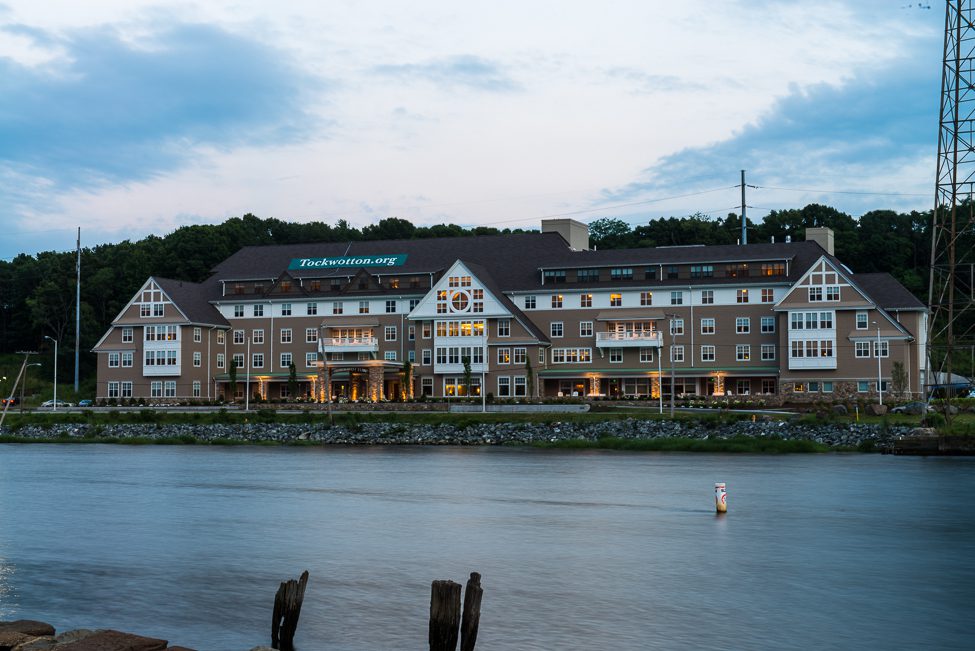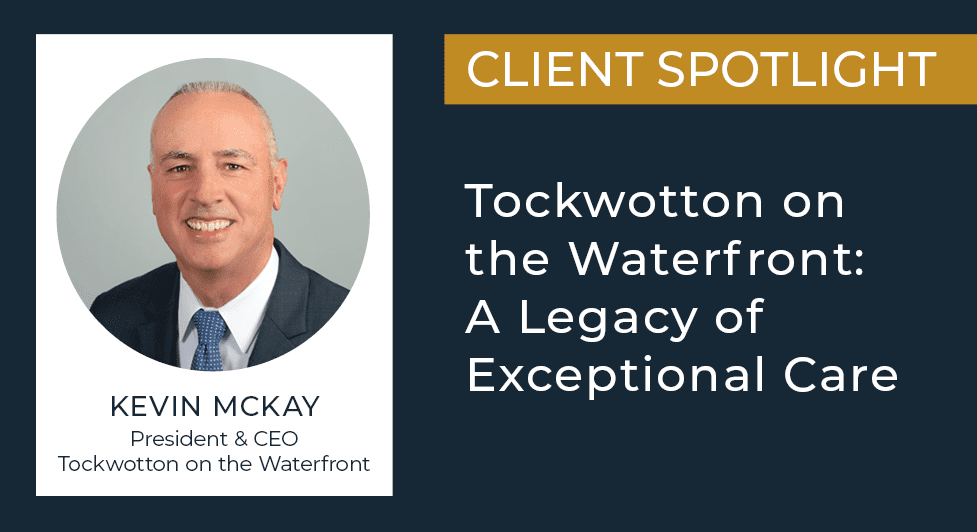There are few institutions that have been as true to the vision of their founders—or have benefited as much from their foresight—as Tockwotton on the Waterfront, a skilled nursing and assisted living (AL) community in Providence, Rhode Island. “We like to think our resident-centered model of care is consistent with the approach Eliza Brown Rogers had in mind when she created our predecessor, the Home for Aged Women, in 1856,” said Kevin McKay, president and CEO. “And thanks to the generosity of our founders and the careful stewardship of my predecessors and board, we have continued serving residents regardless of need.”
Certainly, Rogers knew how to get things done—and she had both the means and the influence to accomplish what she set out to do. The wife of a leading local industrialist and granddaughter of Joseph Brown, the founder of Brown University, Rogers took her religion seriously. She regularly visited indigent women in Providence, dispensing counsel and charity.
But when one of these women, elderly and alone, died of pneumonia in an unheated room, Rogers was determined to do more. Assembling a group of 15 other prominent women, she held a meeting at Providence’s First Baptist Church and raised the funds needed to rent a house for the newly formed Home for Aged Women. In 1864, she erected a larger building, which was renamed Tockwotton Home in 1977. In January 2013, McKay led the move to a more spacious property on Providence Harbor, Tockwotton on the Waterfront.
Joined by Director of Finance Joyce Nallen, McKay sat down with Lument to talk about the responsibilities of leading a senior care community just celebrating its 166th year, the steps he and his staff took to ensure the well-being of residents during the pandemic, and the challenges they face in areas like staffing now that the pandemic is waning.
Lument: I’m sure we’re not the first to note that you have an exceptionally attractive community. It looks like a traditional New England resort. What were factors that led you to build it?
McKay: Our former building had served Tockwotton well for almost 150 years, but as the economics of our business changed, it became clear that we needed a larger, more modern space. We are fortunate in having a portfolio of funds started by our founders that we can use for operations, but our board was concerned at the rate that we were drawing it down.
With a larger building, we could benefit from additional scale and add new services. For instance, in the old building, we had one or two guests a month for short-term rehab. Tockwotton on the Waterfront has an entire 17-bed household devoted to rehab. We also were able to introduce memory care. All told, we went from 66 to 156 beds.
But as proud as we are of its appearance, we are prouder still of the way it serves our residents. It is the first community in Rhode Island purpose-built for patient-centered care. Every element was carefully designed, engineered, and built to promote our residents’ quality of life at every stage of the aging process. Every choice we made—including our decision to offer single rooms throughout—was guided by our desire to empower residents to play an active role in their health.
And while the building gives us a great foundation, our staff really makes those principles come alive. The dedication and professionalism of our staff make all the difference.

Lument: Having the portfolio must have played a role in creating a community of this caliber?
Nallen: It certainly provided a cushion. By the time we opened our doors, we had drawn the portfolio down to about a quarter of its value when we began, but as planned, we have been able to turn things around financially and are almost back up to where we started.
An important contributor to this recovery was the cash freed up when we refinanced our construction loan, which had an interest rate of 8.38%. Our Lument HUD refinance in 2016 lowered our rate to 3.12%, saving us $1.1 million a year. As a result, even during the worst of COVID, our balance sheet remained incredibly strong even as our census dropped.
Lument: Was this decrease spread evenly across the property?
McKay: Occupancy in nursing remained pretty solid throughout, but, as in many communities, it was our AL census that suffered. A number of our residents shifted to nursing, and a few left, not so much because they were afraid of COVID but because they would have to quarantine if we had COVID in the building. We couldn’t replace them. State restrictions prevented us from giving tours for many months, while the automatic two-week quarantine for new residents discouraged others from joining us.
Our overall occupancy hit a low of just under 86% in early 2021, down from 95% in 2019. Last spring and summer, when the state eased its restrictions, we started seeing a recovery. We are now back up to 88%.
Lument: You had a few small outbreaks of COVID, but nothing serious. What did you do to manage your exposure?
McKay: We were one of the first communities in Rhode Island to mandate that staff as well as residents be fully vaccinated and boosted. And right now, we are requiring that anyone over 50 get their second booster. That’s helped.
We also learned about a CMS study of staff cellphone usage showing that when staff worked at two or more communities, these facilities all experienced upticks of COVID. To protect our residents, we told staff that they couldn’t have a second job. To compensate them for their lost income, we instituted a bonus plan — an extra $50 per shift, which we funded with our Paycheck Protection Program money.
We got a great response from our staff. We had virtually zero absenteeism and very low turnover during the pandemic. And we kept our COVID outbreaks to a minimum, even during the height of the pandemic.
Having a stable, committed staff made a difference in other ways as well. They really bonded with the residents and went out of their way to reduce some of the isolation associated with the pandemic. They started a walking club with individual residents and organized Zoom bingo. On Friday afternoons, they would go from room to room serving root beer floats, and a few our musical team members scheduled concerts in the corridors. Residents could open their doors and enjoy live entertainment.
Lument: Has staffing held up now that the pandemic has waned?
McKay: For Tockwotton as well as many other communities, staffing has become our biggest challenge. I think dealing with the pandemic just burned people out. They want to try something new or have more flexibility—many of our staff have switched from a permanent schedule to per diem scheduling.
Our approach has been to show them how much we appreciate their loyalty and hard work. We reinstituted our bonus program in the beginning of the year but switched to offering staff extra pay for pitching in and working open shifts. That seems to be helping. Right now, we are meeting our minimum staffing requirements, which is enabling us to grow our census and continue our recovery. But it’s touch and go.
Lument: What other steps have you taken that have helped with your recovery?
Nallen: Aaron Becker at Lument approached us in summer 2020 about a HUD program that would allow us to refinance and take advantage of lower interest rates. We had experienced an issue in 2018 that affected our Five-Star Rating. One thing we appreciated was that before we devoted time to the application, Aaron had Lument’s Senior Care Advisory Group, led by Brad Granger, take a look at the steps we had taken to remediate the problem to ensure there would be no hang-ups with HUD later in the process. Once Brad gave us the go-ahead, there was one less thing to worry about.
Lument started the underwriting process that fall, but we had to wait until summer 2021 for our census to begin rebounding. In the meantime, they continued to stay in touch and monitor our numbers. Once they saw the trend lines turning around, their underwriting team, working in consultation with HUD, based the application on where our financial performance was going. As a result, we were able to move forward sooner than we would have otherwise. This turned out to be critical. We were able to rate lock in September at 2.57%, saving an additional $250,000 annually. Within a week or two, inflation started to rise, and rates began moving up. Rates right now are 150 basis points higher than they were then. We closed in November.
McKay: We really appreciate that Lument was proactive throughout the entire process, always looking ahead to the next step. Their approach ensured the transaction proceeded smoothly and was instrumental in lowering our rates. When we consider a lender, we’re looking for a counterpart who is knowledgeable and trustworthy and who values a good working relationship. For us, that’s Lument.
